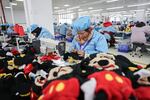
These plastic toys were manufactured in Michigan by American Plastic Toys. But most toys sold in the U.S. are imported and could be subject to tariffs in the incoming Trump administration.
Johannes Eisele
The holiday season is typically a festive time for children across the U.S., but this year it’s an anxious season for the country’s toymakers.
Most of the toys sold in the U.S. are manufactured in China, and companies are worried they could get a lump of coal next year — in the form of steep import taxes promised by President-elect Donald Trump.
That threat hung like a cloud over a trade show last month in Orlando, Fla., where toy vendors were already looking ahead to next year’s sales.
“All anybody was talking about was tariffs,” says Jay Foreman, CEO of the Boca Raton, Fla.-based toy company Basic Fun! “We know that if tariffs hit, that prices are going to go up and it’s going to affect the consumer. And so we’re absolutely in panic mode in our industry.”
Foreman got his start in the toy business selling the stuffed animals offered as prizes at many carnivals and beach boardwalks.
“People do really win those,” he says. “I can tell you because I’ve made a career and a living out of selling that product.”
Made in China
When Foreman joined the industry in the mid-1980s, he recalls, the toys he sold were still manufactured in Brooklyn, N.Y., by a workforce that was largely undocumented. Production soon shifted overseas, however, first to South Korea and eventually to China — which today dominates the global toy industry.
Foreman’s company sells a wide variety of toys, from trendy items based on the latest Marvel movie to classics like Lincoln Logs and Tinkertoys.

China's economic growth in the first three months was driven in part by strong industrial activity and exports.
STR
He worries that a 60% tariff on Chinese-made products that Trump promised during the presidential campaign would raise prices and cut into sales. Toy companies might absorb some of the cost, but most would be passed on to consumers.
“You’re going to see a $30 Tonka Mighty Dump Truck become a $45 Tonka Mighty Dump Truck,” Foreman says. “The prices on so many things that consumers buy in places like Walmart and Target and on Amazon will spike.”
Uncertain time for toymakers
Toymakers could try to dodge the steepest tariffs by moving factories to other countries, but that’s no guarantee.
“What’s to say that we all start to move our production out of China into Vietnam and India and Mexico, and then the administration makes a deal with China and now the target is on the back of the Vietnamese or the back of Indians and the Mexicans,” Foreman says. “For sure Mexico is in the sights.”
In late November, Trump threatened to impose a 25% tariff on imports from Mexico and Canada — two of the United States' biggest trading partners.
Trump doesn’t always deliver on such threats. Back in 2019, he was preparing to slap tariffs on toys, video games and cellphones from China but backed down, partly to avoid playing the Grinch and spoiling the holiday shopping season.
Toy companies could avoid tariffs altogether by manufacturing domestically. But Foreman says that in most cases that’s too expensive. And customers generally aren’t willing to pay the additional cost. He has tried making Lincoln Logs in Maine, for example, but ultimately shifted production back to China.
“We’ve had product on the shelf that says ‘Made in the USA’ and a product on the shelf from a competitor that was made in China,” Foreman says. “The consumer would rather go with the value.”

Shipping containers are stacked on a container ship at the Port of Los Angeles in California on Dec. 4. Many companies across the U.S. are trying to figure out how they could be impacted by tariffs if President-elect Donald Trump follows through on his threats.
Mario Tama
Making sense of tariffs
Even toymakers that don’t rely on China feel unsure about how tariffs will affect their business. American Plastic Toys, for example, still manufactures in the United States. Its toys are mostly made of molded plastic that doesn’t require a lot of labor. The toys also tend to be bulky, which would make them difficult to ship from factories overseas.
“We’re in a niche,” says company president John Gessert.
Having factories in Michigan also allows American Plastic Toys to deliver quickly, so retailers don’t run short of toboggans in the winter or sand pails in the summer.
“The worst thing you can do as a big retailer is have empty, unproductive shelf space,” Gessert says. “We’re here to backfill things, and we can react fast if we need to.”
A tax on imported toys might give Gessert’s company an advantage over foreign competitors — but he’s not banking on that.
“We’ve been making toys since 1962,” he says. “If we had designed a business model based on tariffs being in place, we wouldn’t have been in business this long.”
Foreman of Basic Fun! says while it might make sense for the U.S. to use tariffs to protect strategic industries such as advanced computer chips, he doesn’t think Tonka trucks or Tinkertoys belong in that category.
“Be diligent and careful and selective about what you protect,” Foreman says. “Things like T-shirts and teddy bears and tennis shoes, we don’t need to make that stuff here.”